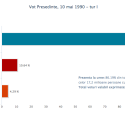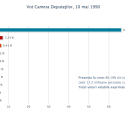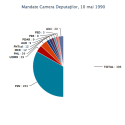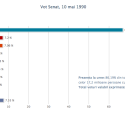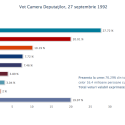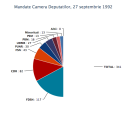IMPORTANT DEVELOPMENTS
-
- 1. Politics. Victor Ponta is re-elected president of the Social-Democratic Party of Romania
- 2. SOCIETY. The Government adopts social assistance measures for laid-off workers
- 3. Economy. BNP Paribas and Societe Generale call for investing in Romanian Government bonds
- 4. Politics. The Government gives its approval to the new law concerning the organization of referenda.
1. Victor Ponta was re-elected president of the Social-Democratic Party of Romania
The Congress of the Social-Democratic Party of Romania, which also celebrated 120 since the establishment of the first social-democratic movement in the country, was marked by the re-election of Prime Minister Victor Ponta as president of the party. Victor Ponta received 3851 votes of the 3932 valid ballots cast in the internal elections of the main center-left party of Romania. Liviu Dragnea was elected executive president of the PSD. The Congress and the elections were hailed by Martin Schulz, President of the European Parliament, Elio di Rupo, Prime Minister of Belgium and Robert Fico, Prime Minister of Slovakia.
In his speech, Prime Minister Victor Ponta praised the former presidents of the party. The Prime Minister emphasized the scale of the party’s electoral victories in 2012, but also warned the leadership to be wary of complacency, as the economic and political tasks facing the government are paramount for Romania’s recovery from the economic crisis.
The Congress also highlighted the party’s desire for increased transparency and internal democracy – the new national and regional leadership was elected via electronic voting, the PSD becoming the first Romanian party to employ the new technologies in designating their leadership.
The party launched its new website, a tool designed to show that the PSD is keeping up with new social reality of 21st century Romania, trying to build-up its online presence build-up on the success of its PSD Online initiative. The online organization also became an official organization of the party, following the approval of the Congress.
The leaders of the political organization expressed their commitment to the social state and pleaded in favor of policies that are not based solely on austerity. The official documents adopted by the Congress PSD call for measures to restart economic growth and to combat poverty.
The party also discussed the problems Romania faces and showed its commitment towards reforming the institutional framework of the country and the amendment of the Constitution by electing for the first time regional vice-presidents, in order to show the importance of subsidiarity and de-centralization.
2. The Government adopts social measures for the benefit of laid-off workers
The Government adopted Emergency Ordinance no. 116 concerning the social measures taken for the benefit of laid-off workers formerly employed by state owned companies. The legal initiative only prolongs the effects of existing laws, that expired on December 31st. The ordinance is not the first initiative of its kind, several other similar projects dating from 2006 or 2009
Government figures emphasized that the Government is not planning to dismiss any employees, but only enacts social protection measures for the existing unemployed workers. The Government representatives also emphasized that it will look out for the interests of the workers. ANAF’s intervention to guarantee that the funds given to the Mechel Company will be used for the payment of outstanding and compensatory wages stands proof of the Government’s intentions to ensure an efficient and effective safety net for the unemployed.
3. BNP Paribas and Societe Generale recommend Romanian bonds
As an additional signal emphasizing the positive prospects of Romania’s economic evolution, analysts of the BNP Paribas and Societe Generale recommended international investors to invest in Romanian Government bonds, anticipating a positive evolution and a decrease in the yield of circulating titles.
BNP Paribas calls for buying bonds maturing in April 2020, as part of an auction to be held this week, arguing that the improvement of inter-bank liquidities will have a favorable effect on the Romanian bond market. According to the bank, Romania’s credit profile has markedly improved, a fact recognized by several rating agencies.
BNP Paribas also recommends investing in the bonds maturing in 2017. Societe Generale analysts noted they have “serious reasons” to recommend changing Hungarian-issued bonds for Romanian Government issued bonds.
4. The Government approves the new law concerning the organization of referenda
The legal proposal drafted by USL MPs was favorably appraised by the Government. The draft observes the recommendations of the Constitutional Court and sets-out a new participation threshold for all referenda to be held in Romania.
The legal proposal drops the existing 50%+1 turnout threshold, an almost impossible to achieve threshold given traditionally low turnout in Romanian elections. The new threshold is set at 30% of the people inscribed in the electoral register. The proposal also establishes another threshold – in order for the results to be valid, they have to meet the approval of at least 25% of the people in the permanent electoral lists.
Most European countries have less strict threshold conditions and for Romania the quota is almost impossible to reach, given that at least 3 million Romanian citizens live outside the national borders. The lesser threshold was suggested given the necessity of amending the Constitution and the difficulty of approving the results of local referenda.



